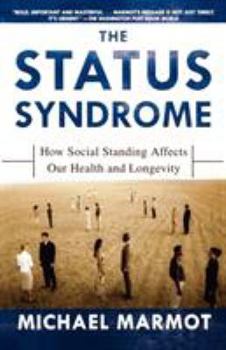The Status Syndrome: How Social Standing Affects Our Health and Longevity
Select Format
Select Condition 
Book Overview
"Bold, important and masterful . . . Marmot's message is not just timely, it's urgent."
-The Washington Post Book World
Format:Paperback
Language:English
ISBN:0805078541
ISBN13:9780805078541
Release Date:September 2005
Publisher:St. Martin's Press
Length:336 Pages
Weight:0.70 lbs.
Dimensions:0.9" x 5.4" x 8.4"
Customer Reviews
4 ratings
Really cool - to help you live longer
Published by Thriftbooks.com User , 14 years ago
I got this book ONLY to read the research. Often it is true, that the truth, is not logical. ... or at least counter-intuitive. I ignored all the social ramblings. This book is WELL RESEARCHED. It seems status DOES predict life expectancy! Very interesting research and conclusions. Definitely motivating. ... I'll live longer if I get my PhD. More control/autonomy in one's live = more life. Who knew! Great book! Worth the read - or even a skim.
An important contribution to understanding health inequalities
Published by Thriftbooks.com User , 19 years ago
Marmot began his important work on social determinants of health with two long term studies of the British Civil Service finding that those who enjoyed higher status roles had better health and longer life expectancy than those who had lower status roles. This gradient from higher to lower applied throughout the service. Why was it so? And did it apply in other social and cultural contexts? This book is a compelling exploration of the commonality of this phenomenum throughout both developed/transitional and developing country contexts, exploring the evidence and sifting the reasons for it. Status is found to be crucial - people with more opportunity to control their lives are more resiliant to stress and enjoy better health as a result (I simplify). It is not that healthier people enjoy better status because they are healthier - an argument carefully considered and dismissed - but people enjoying social contexts that enable them to secure status will enjoy better health and longer life. This applies as much to the rich social opportunities of Kerala in India as it does to an upper middle class suburb in the United States. Poverty, in itself, once basic needs are met, is not the issue as long as it is equally shared with all, what matters is the disequilibrium between people's status and being in the population denied access to opportunity to control one's life. The book is well-written, closely argued, and could change how you see the world for good.
Invaluable teaching aid for public health students
Published by Thriftbooks.com User , 19 years ago
This book is the perfect introduction to the study of Health Inequalities, especially in the context of occupational health. Students are gripped.
A topic in its infancy
Published by Thriftbooks.com User , 20 years ago
You are a hot shot in a company, though not the boss. You are paid extremely well, but, again you have plenty of bosses above you (say the partners of an investment firm). Is it better than deriving a modest income being your own boss? The counterintuive answer is NO. You will live longer in the second situation, even controlling for diet, lifestyle, and genetic predispositions. Marmot spent years poring over data; he left no stone unturned and is well read in the general literature on human nature. This idea of people living longer when they exert control over their lives has not spread yet. That people lead longer lives when they trust their neighbors and feel part of a community is far reaching. Just think of the implications on social justice etc. Also think that everything you learn on human preferences and well-being in both economics and medicine is either incomplete (medicine) or bogus (economics). The book is well written, humorous at times, and rigorous --it reads like a well-translated scientific paper. But it feels that it is just the introduction to a topic. Please, write the continuation.





